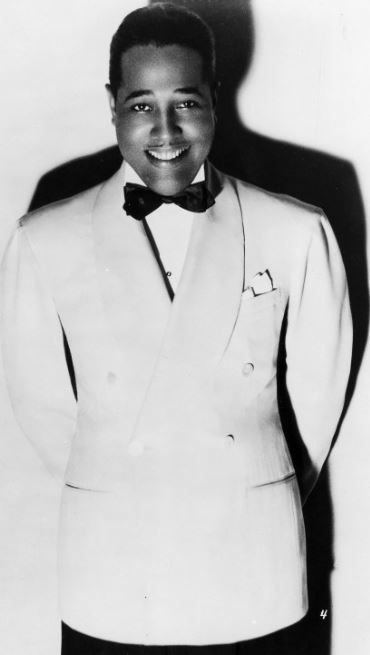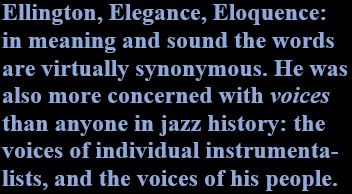The Video/Audio below is an excerpt from the 8th show of my radio series Voices and Freedoms: A History of Jazz, based on my 1976 book of the same name. The episode is about Duke Ellington. The 16-part series played across the nation for five years in the late 70’s/early 80’ and holds its relevance—or is even more so—today than it was back then. This is perhaps especially the case with Ellington because of his dedication to his people and the Black experience in America. The excerpts present about 6 to 10 minutes of the original 30-minute broadcasts. The link above takes you to information about the book and our plans to re-release it and provide access to the full-length original shows. Go HERE for a complete list of shows and links to all excerpts.
 Elegance radiated from Edward Kennedy Ellington from an early age, so though he had many nicknames—Cutie, Wucker, Dumpy—the one that stuck, naturally, was Duke. Ellington, Elegance, Eloquence: in meaning and sound these words are virtually synonymous. He was also more concerned with voices than anyone in jazz history: the voices of individual instrumentalists, and the voices of his people.
Elegance radiated from Edward Kennedy Ellington from an early age, so though he had many nicknames—Cutie, Wucker, Dumpy—the one that stuck, naturally, was Duke. Ellington, Elegance, Eloquence: in meaning and sound these words are virtually synonymous. He was also more concerned with voices than anyone in jazz history: the voices of individual instrumentalists, and the voices of his people.
He wrote over 2000 compositions, and his concern for instrumental voices led him to virtually double jazz’s tone palate and open up new ways to think about arranging and voicing jazz compositions. As much as anyone, he brought jazz into the American mainstream, yet his devotion to his people and Black culture stands as one of the fiercest, proudest signals meaning as much, if not more, today than ever. As one critic put it, “…at times he and his orchestra developed and maintained almost singlehandedly a Black cultural tradition.”
The excerpt below highlights first his concern with those instrumental voices, then jumps to near the end of the full-length, original show to highlight Ellington himself speaking  about the importance of his people in American history. What’s left out are long sections of several important works which illustrate his growth as a composer and arranger. I spend some time, for example, with the piece “Concerto for Cootie,” which is the basis for one of his jazz/pop hits “Do Nothing Till You Hear from Me.” That range from concerto to pop song symbolizes the range of his music. Well in advance of the Swing Era, he and Irvin Mills wrote “It Don’t Mean a Thing If It Ain’t Got That Swing.” At the other end of the spectrum were those concertos, suites, and even sacred concerts which have played in churches and cathedrals all over the world.
about the importance of his people in American history. What’s left out are long sections of several important works which illustrate his growth as a composer and arranger. I spend some time, for example, with the piece “Concerto for Cootie,” which is the basis for one of his jazz/pop hits “Do Nothing Till You Hear from Me.” That range from concerto to pop song symbolizes the range of his music. Well in advance of the Swing Era, he and Irvin Mills wrote “It Don’t Mean a Thing If It Ain’t Got That Swing.” At the other end of the spectrum were those concertos, suites, and even sacred concerts which have played in churches and cathedrals all over the world.
 The excerpt below ends with his suite My People: first his spoken introduction to Blacks in American history, then a meditative section, sung by Mahalia Jackson, which centers us on love and God. Near the end of his autobiography he conducts a mock interview with himself. To the question, “Besides God what sustains you?” he answers “Not besides. How does one manage without God.” It’s difficult not to engage in sainthood-like language. Of course, he wasn’t one, but love for music, for his people, for God—these were the fonts of his prodigious musical output and influence. Towards the end of his life as the honors piled up—including an honorary doctorate from Yale—Ellington said, “Fate has been kind to me. She doesn’t want me to be famous too young.” In 1999 he was given a posthumous Pulitzer Special Prize for music.
The excerpt below ends with his suite My People: first his spoken introduction to Blacks in American history, then a meditative section, sung by Mahalia Jackson, which centers us on love and God. Near the end of his autobiography he conducts a mock interview with himself. To the question, “Besides God what sustains you?” he answers “Not besides. How does one manage without God.” It’s difficult not to engage in sainthood-like language. Of course, he wasn’t one, but love for music, for his people, for God—these were the fonts of his prodigious musical output and influence. Towards the end of his life as the honors piled up—including an honorary doctorate from Yale—Ellington said, “Fate has been kind to me. She doesn’t want me to be famous too young.” In 1999 he was given a posthumous Pulitzer Special Prize for music.
♦ Go to the Diversity Training and Teaching page of this site.